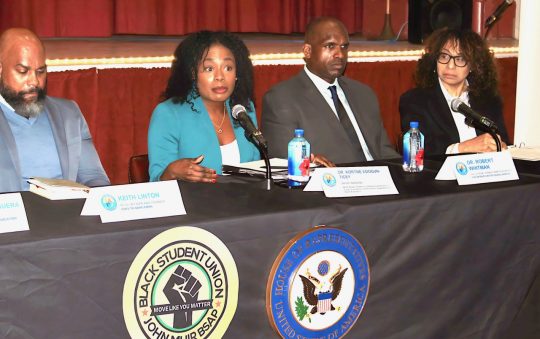
Black parents want a quality education for their children. But countless demands that their children have a right to such an education typically fall on deaf ears, even though Black students remain disproportionately at the lowest achievement levels. Low achieving students should be the chief target of education reform, but non-English and limited English-speaking students in Los Angeles (LAUSD) receive far more resources than Black students.
A few years ago, New American Media (NAM) convened a roundtable on Black parents engaging in their children’s schools in LAUSD. Issues included: What’s right and what’s wrong with Black children’s education? What are parents’ greatest worries about their children’s schools? And what do schools need to do better?
Despite overwhelming evidence that parent involvement helps improve student achievement, low income Black parents especially, are generally not really part of the school decision making process. Countless examples confirm this, like compensatory education (ESEA Title I), which mandated parent involvement in federal programs for “disadvantaged” students. Most often, parents were, (and are), mostly rewarded for complying with regulations, not for contributing to quality outcomes. Title I advisory councils routinely did the bidding of the principal and strong, challenging parents were treated as trouble makers. Unfortunately, things haven’t changed.
External parent groups also have been largely unsuccessful. They include education committees in civil rights organizations (NAACP, SCLC, Urban League, etc.) Currently, there are a sprinkling of parent advocacy groups like the Black Parent Union in L.A. County, Parent Revolution and the statewide Title I Parent Union. Their stated goal is training and organizing parents to improve educational results for Black students. However, sustainability is a major problem, especially for poor parents who have a hard time balancing the needs of their families and everyday life with the systemic barriers to reaching their goals. Although a small cadre of committed parents will always persevere, dysfunctional school district practices continue without serious challenge. School districts seem to count on parent “burnout” which perpetuates the very inequities parents fight to eliminate. (Ideally, a solid cadre of committed Black parents expands and becomes a significant force for sustainable Black parent power, but this is rare. .
As mentioned, New American Media called together a group of Black parents to share perspectives on a variety of issues affecting their children’s education and on the role of parents in helping to ensure that their children receive a quality education. The following are excerpts from a facilitator’s account of that meeting.
“The state of California should finance programs specifically designed to improve the academic performance of African American students; parents and community advocates need a platform, including media, to mobilize more Black parents to join efforts to improve their schools.” Those recommendations topped a list of school funding priorities laid out by African American parents at the forum.
The comments on education finance were in response to California’s Local Control Funding Formula (LCFF) which increased state funding to local school districts. (Under LCFF, the state is supposed to provide the greatest funding increases to schools in low-income communities and those with large numbers of students who are learning English as a second language. The parents did not feel Black children receive equitable funding.
A number of participants said the state should also provide additional funding to improve English-language skills of Black students. One commented, “People don’t understand that Black kids are often ostracized simply because of the way they speak.” Some Black organizations in Los Angeles have already supported the need for classroom instruction that addresses the linguistic divide. (The Black Community, Clergy and Labor Alliance (BCCLA) Education Committee is currently partnering with LAUSD to close the Black achievement and address the needs of Standard English Learners. “Black students have unique linguistic and cultural histories and experiences that must be understood and accepted through the implementation of culturally relevant and responsive pedagogy.”)
A member of the California Title I Parent Union called for school district and state action that focuses attention on improving education for African American students. “There is no legislation that specifically targets Black students……….We have to advocate for legislation in our community.” Another participant, “A broader movement is needed to achieve change and a lack of parent involvement in schools, and the failure of many Black parents to hold their children accountable for their behavior, also contribute to the disproportionate number of Black male expulsions and suspensions.” Another added, “School districts have primary responsibility for educating students, and must be held accountable to do that.”
The LCFF requires school districts to involve parents in decision-making on how additional funds are spent and participants felt Black parents are still not encouraged to participate in local school decision-making. They also felt they needed to be more organized. Parent involvement contributes to improving education results for their children. However, they must also demand their rightful role in the school decision making process. Working collaboratively with other groups, they represent a force school officials can’t afford to ignore. Black parents want their children to receive the best possible education. They and their children deserve no less.
(Black Parents seeking alternatives to improve their children’s education should consider joining the Black Community, Clergy and Labor Alliance (BCCLA) Education Committee. It focuses, unapologetically, on improving Black students’ education. One of its primary goals is closing the African American achievement gap. Interested parents please contact Larry Aubry: 323- 308- 8837.)







